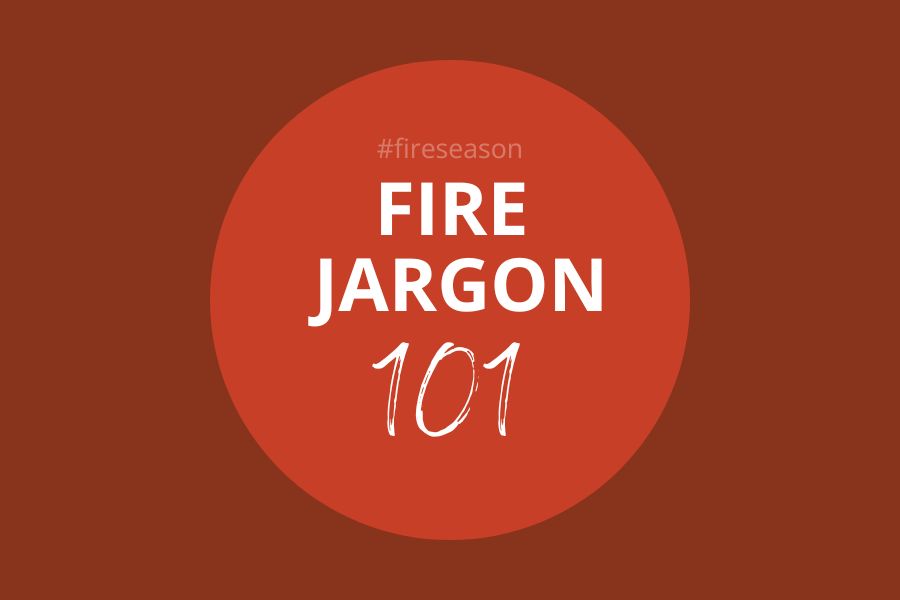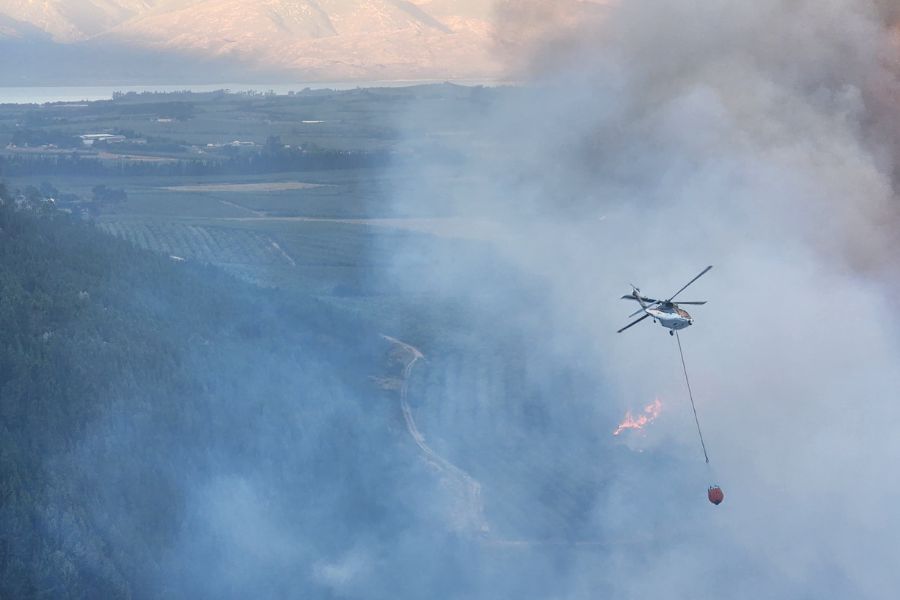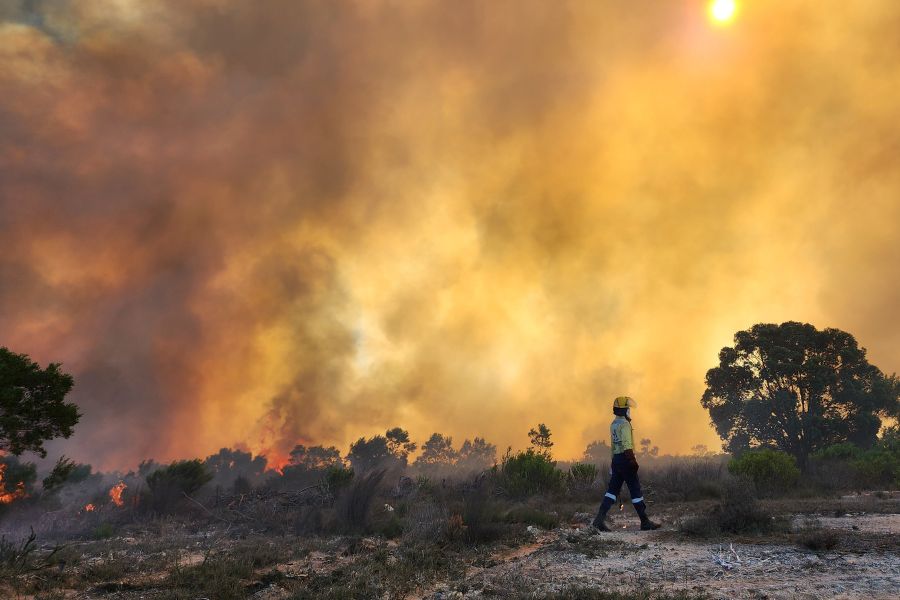
There are many technical terms used in the veldfire industry.
But each word or phrase means something very specific. For the Greater Overberg Fire Protection Association, some of these terms might be specific to the Overberg.
Here are key words and phrases to remember:
Aerial resources
Provincial Disaster Management Centre provides resources to assist the Fire Services and landowners with fire suppression efforts.
Resource available for the 2024/2025 Fire Season
A helicopter and spotter plane are based at Bredasdorp from the beginning of December to end April. The aircraft could be used in the rapid initial attack. Additional resources can be contracted.
- Aerial resources can only be activated via the Fire Chief and/or his authorised Incident Commander
- Landowners must sign the Kishugu/Working on Fire Memorandum of Understanding (MOU) in order to activate aerial assistance. For a form, please email Keith: info@overbergfpa.co.za. The MOU can also be found on our website.
- REMEMBER: Landowners MUST telephonically confirm the request for aerial assistance, before the service provider will activate the service. No aerial resources will be sent without your signed MOU and verbal confirmation.
Control room
The 24-hour service that receives all veld and structural fire reports. The role of the control room is to:
- Record the report
- Dispatch fire services
- Manage the resources allocated to the incident
- Liaise between fire services and public
Controlled burn
Controlled burning refers to the execution of a carefully planned fire set intentionally to reduce/reset veld age to reduce veldfire risk and/or help in ecological restoration. Controlled burning is often referred to as prescribed burning.
FDI, or Fire Danger Index
An index created to measure the degree of danger of fire in an area. It combines a record of dryness based on rainfall and evaporation with meteorological variables for wind speed, temperature and humidity.
Flare-up
Re-ignition of a veldfire (or wildfire) or part of the fire line that has already been extinguished.
FMU, or Fire Management Unit
This consists of a localised area in which integrated fire management efforts between individual landowners can be most effectively coordinated.
FMU leader
Each FMU has a leader, chosen by members of the FMU. These leaders represent FMU members in their areas regarding goFPA matters.
Handover
The Fire Services will hand over a fire to a landowner when they deem it to be safe (fire out). The expectation is that the landowner must ensure there is no flare up, by mopping up for a minimum of 24 hours, or until the fire is cold. Should the landowner not have the capabilities to do this, then contact the Fire Services, who can deploy a resources to assist, at a cost to the landowner.
There are additional resources available to help landowners with this.
IC, or Incident Commander
The person in charge of the fire/incident.
At the start of a fire, this could be the landowner, FMU leader or the Fire Services – whoever is first on the scene at a veldfire. If the landowner is first on the scene, then command will be handed to the Fire Services when they arrive at the veldfire.

ICS, or Incident Command System
The Incident Command Systems is an emergency management tool that is used by all types and levels of emergency services at veldfires or incidents to ensure standardisation and efficiency. It is designed to ensure the best cooperation and communication between different organisations at any incident.
Incident/Event
This term is used when formally reporting on a veldfire (in other words, a wildfire) to landowners, the media or on social media.
Initial attack
The actions taken by the first responders on arrival at a veldfire to protect lives and property, and to prevent further spread of the fire.
For the goFPA, initial attack refers largely to the 1st hour of suppression, which is critical, with all available resources – the Fire Services and landowners – working in a coordinated way to ‘attack’ the fire under the guidance of the Incident Commander.
After this 1st hour (extended attack) the Fire Services, FMU leaders and landowner will decide on the best tactics to follow. Depending on the availability of resources and conditions on the day, direct or indirect firefighting tactics may be used. The involvement of the landowners is very important to successfully implement the chosen tactics.
Minimum readiness
When we refer to minimum readiness for fire season, here are the steps landowners should take:
- Please check and test your fire-fighting equipment.
- Share keys of access gates with your neighbours.
- Test your radios, including batteries (if applicable).
- Let your neighbours know when you will not be on your land – forward the contact person’s details to the goFPA. Please note, in the absence of the landowner, a responsible person must be on or near his or her land. This is especially important on Red FDI days.
- Clear areas around your homestead and other important infrastructure.
- Check and document the water points on your land.
- Check your fire breaks.
Prescribed burning
This term refers specifically to burning with a set plan to reach a specific objective or end-stage, while the execution of such a burn is done in a controlled manner. The term controlled burn and prescribed burn are often used interchangeably.
Suppression
Actively fighting a fire to extinguish it.
Efforts at a veldfire will be coordinated by the goFPA team with the help of the FMU leader and the landowner. The objectives are to make informed decisions, share data (high danger areas, fuel loads, infrastructure, water points etc.) and use the limited resources that are available effectively.

Veldfire
This refers to a wildfire, or a fire that is out of control, as per the National Veld and Forest Fire Act.
Veldfire Suppression Fees
All local and district municipalities have to charge for services rendered and landowners can expect to receive invoices from the Fire Services this season. Active goFPA members can receive free suppression services, excluding specialised services and aerial support.
WOF teams
Working of Fire teams are part of the Extended Public Works Programme, with trained firefighters and fire management services.
For the 2024/2025 fire season:
- Four teams are available in the Overberg.
- Focus will be on using this resource for extended attacks and when in close proximity to a base.
- Working hours are limited and arranging overtime requires time and comes at a cost.
